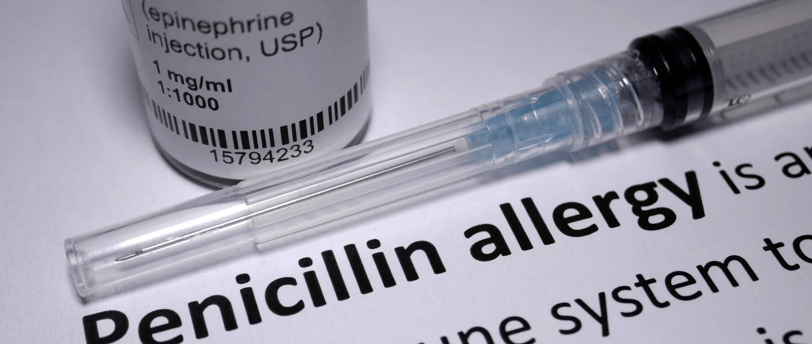When the medicine becomes the allergen
Diving into my personal experience with drug hypersensitivity, as well as the pharmacological and immunological science behind it.


The British Society for Allergy and Clinical Immunology (BSACI) defines a drug allergy as an adverse drug reaction with an established immunological mechanism. Working in the pharmacy as a pharmacy assistant or on placement, one of the WWHAM questions we are taught to ask when selling medication is "do you have any allergies?", but as someone with a drug allergy myself, I wanted to know the pharmacological and immunological logic behind it.
Last week, I sat my final second year exam and a few hours later, my lips started to swell up. This had happened to me before - the day after a previous exam - and so, I guessed that it must be some kind of stress response. Nevertheless, as time progressed, the swelling started to dramatically spread across my lips, to my cheek and then to my eye. My pharmacy-oriented brain started to catastrophize, wondering whether this was a hypersensitivity reaction or whether it was something more serious, like oedema! Having been seen by an A&E doctor, I was given chlorphenamine and told that I must have been allergic to something I had touched or consumed that day. Advised to keep an allergy diary, I assumed that it must have been the supermarket tuna sushi that I had eaten after my exam.
Roughly a week later, I took some ibuprofen at night due to a headache that wouldn't allow myself to sleep. Before going to sleep (and an hour after taking ibuprofen), my eye slowly started to swell but I brushed it off due to the fact that my eye had been swelling on-and-off for a few months - it always disappeared the next day, so I wasn't worried. In the middle of the night, I woke up to a completely swollen face.
That's when the dots connected; after both of my exams, I recalled having a headache, so I took some ibuprofen to alleviate it. The day that I went to A&E, my dose of ibuprofen had slipped my mind because I had been taking ibuprofen safely, with no issues, for as long as I could remember. I was also (shamefully) a frequent ibuprofen-taker, which would explain the frequent eye-swelling that I had encountered for months. It wasn't tuna sushi - I was allergic to ibuprofen.
Ibuprofen is a Non-Steroidal Anti-inflammatory Drug (NSAID) and according to NICE guidelines, hypersensitivity to this group of drugs is common, particularly affecting 5-10% of asthmatic patients. Although this is true, the confusion in my case referred to the fact that I had never experienced hypersensitivity to ibuprofen or other NSAIDs before.
The clinical manifestation of my swelling episode is defined as angioedema, which is characteristic of a Type 1 hypersensitivity reaction. As a broad overview, when exposed to an allergen, the body produces an IgE-mediated antibody response. These antibodies (originally released by B cells), bind to specific Fc receptors on mast cells and basophils. These antibodies then undergo cross-linking, which results in degranulation of the mast cells and basophils, ultimately resulting in the release of inflammatory mediators. Examples of inflammatory mediators include histamine (which is why anti-histamines are classed as allergy tablets) and prostaglandins. However, in the case of NSAIDs, NSAID hypersensitivity can often occur through non-IgE-mediated pathways. Still, the end result (the release of inflammatory mediators) is clinically similar. In my case, the release of these inflammatory mediators caused vascular dilation and permeability which caused fluid to leak into my tissues - thereby causing swelling.
Over time, my immune system had likely become sensitised to ibuprofen after years of repeated exposure. As a future prescriber and current pharmacy assistant, this personal situation was eye-opening. It emphasised the fact that drug allergies can emerge at any point in one's life and it is imperative to consider that one can be allergic to a drug without a history of being allergic to it.
Another aspect of note is the fact that I have always had an anaphylactic response to penicillin. Having developed an allergy to ibuprofen, I wondered how I could be allergic to two pharmacologically unrelated drugs, which led me to the personal discovery of Multiple Drug Hypersensitivity Syndrome (MDHS). Interestingly, Sapan Behera et al. (https://doi.org/10.2174/1574884713666181112125714) states that the most common cause of MDHS is an allergy to antibiotics (e.g. penicillin), followed by an NSAID allergy. The aforementioned journal is a fascinating read which I highly recommend, however I won't recount all the findings in this blog post.
My research into this topic has aided me in my journey to becoming a pharmacist, especially as allergies are a common condition. Allergies can be confusing and, in many cases like mine, diagnosis is essentially a process of trial and error. Being more aware about the mechanisms, epidemiology and differential diagnoses concerning allergic reactions are essential in providing person-centred care, especially with such an unpredictable and deeply individual condition. Awareness, vigilance and empathy remain the best tools in pharmacy.

